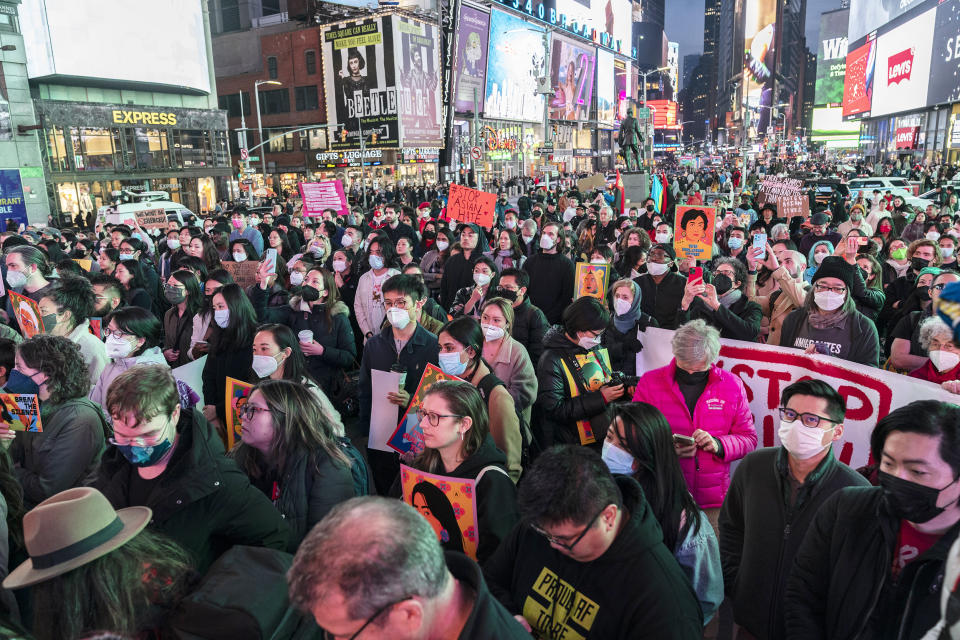Cities across U.S. hold rallies to commemorate Atlanta-area spa shootings
- Oops!Something went wrong.Please try again later.
One year after a mass shooting across three Atlanta-area spas killed eight people, including six women of Asian descent, communities rallied in cities across the country to remember the victims.
Advocacy group Asian Justice Movement organized rallies Wednesday hosted by Asian American and Pacific Islander community leaders in a dozen cities touched most heavily by the increase in violence, from San Francisco to Detroit to New York City.
Commemorating the Atlanta-area shootings on March 16, 2021, they called for policy changes to address the spike in racist and gender-based violence since the pandemic began.
Anti-Asian hate crimes increased 339 percent nationwide last year, according to one study. High-profile attacks on Asian women, such as the killings of Michelle Go and Christina Yuna Lee earlier this year, continue to stoke fear within the community.
New York City saw multiple demonstrations organized by various groups. In Times Square, attendees and passersby crowded to listen to a lineup of speakers and performers.

Author Min Jin Lee, who wrote the bestselling novel “Pachinko,” told the crowd she conducted an informal survey on Twitter earlier this month asking fellow Asian Americans whether they’ve changed their daily behaviors to adapt to the wave of hate.
From the nearly 500 responses, she learned people have begun wearing hats and sunglasses to hide their Asian appearance, developing contingency plans in case of an attack, avoiding public transportation, taking self-defense classes and refusing to speak their native language in public.
“When I think of my brothers and sisters almost imprisoning themselves in their homes, modifying their own faces in the hopes of not getting hurt, I get angry,” Lee said. “Why are we tying ourselves in knots trying to solve a problem that we did not create?”
Activist Amanda Nguyen, founder of civil rights nonprofit group Rise, said the violence of recent years has felt like a “repeating nightmare.” Nearly three-quarters of Asian American women reported having personally experienced racism or discrimination in the past 12 months, according to research released this month.
“There is a long history, a long tradition, of people taking their painful living truths and channeling that into justice, and that is what we are here today doing,” Nguyen, who was named one of Time's 2022 Women of the Year, said. “We are in a moment of reckoning. We get to decide what kind of country we are, what kind of people we are.”
In Atlanta, advocates and elected officials gathered at the Georgia Capitol in commemoration of the lives lost in their home city. Speakers stepped up to the podium to discuss what it takes to create viable change to a pattern of violence that hasn’t waned.
Sarah Park, president of Atlanta’s chapter of the Korean American Coalition, had organized a vigil in the aftermath of the shooting last year. She said issues impacting Asian Americans often feel unheard by society, and harmful stereotypes about Asian American women have painted victims as weak or as somehow at fault for the violence inflicted upon them.
“We are living in a repetitive circle of pain of losing our parents, siblings and children to senseless violence that we have to face every day of our lives,” Park said, “seeing our mothers, our sisters and our daughters used as a scapegoat.”
Victoria Huynh, vice president of the Center for Pan Asian Community Services, the oldest organization in the Southeast focused on issues concerning Asian Americans, said stopping hate incidents against the Asian American and Pacific Islander community requires representation at all levels of government.
Huynh said relieving AAPI communities also takes supporting tangible resources and language access, as well as culturally competent health care, social services, education and more. Children like her daughter and her peers, she said, deserve to learn a fuller picture of American history at school — which entails the inclusion of AAPI history.
“We demand action yesterday, today, tomorrow and every day hereon after. We stand together because enough is enough,” Huynh said. “We will no longer be silenced. Our communities and victims will not be forgotten. We will not wait for another tragedy in our communities to do something about it.”
On the other side of the country, in San Francisco, events addressing the collective trauma of the ongoing violence stretched from afternoon into evening. Programming at the Asian Art Museum featured self-defense training and a creative healing space, as well as live performances and remarks from speakers.
Canadian actress Olivia Cheng, who stars in the martial arts crime drama TV series “Warrior,” spoke during the event, telling the audience the Atlanta-area killings left her unable to get out of bed for weeks. After describing multiple instances of racist verbal incidents she experienced throughout her life, Cheng emphasized to the audience the importance of sharing their stories.
“While Atlanta left me numb and exhausted, it was watching your collective grief and anger bloom into bravery, awakening, community, resourcefulness and resilience that ultimately got me out of bed one year ago,” she said. “That is the power of story you are creating as Asian American women.”

